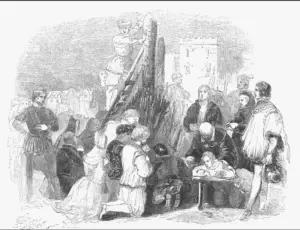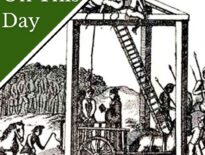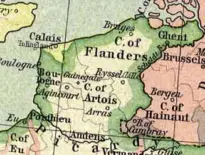 This week's Monday martyr is Protestant martyr John Hullier (Hulliarde, Huller or Hullyer), who was burnt at the stake in Cambridge for his Protestant faith on Maundy Thursday 1556, 2nd April, in the reign of Queen Mary I.
This week's Monday martyr is Protestant martyr John Hullier (Hulliarde, Huller or Hullyer), who was burnt at the stake in Cambridge for his Protestant faith on Maundy Thursday 1556, 2nd April, in the reign of Queen Mary I.
Martyrologist John Foxe tells is that Hullier was educated at Eton before becoming a scholar and then a "conduct", a chaplain, at King's College, Cambridge, in 1539. Some time after that, he became curate of Babraham, near Cambridge, and had "divers conflicts with the papists" after preaching at King's Lynn. This led to him being questioned by Dr Thomas Thirlby, Bishop of Ely, who sent him to be confined in Cambridge Castle and then the Tolbooth in Cambridge, where, according to Foxe, he was imprisoned for three months.
On Palm Sunday 1556, he was examined at Great St Mary's in Cambridge by "divers doctors, both divines and lawyers", including Nicholas Shaxton, Bishop of Salisbury, but he would not recant his Protestant faith. He was condemned as a heretic and degraded, i.e. deprived of his church office. His response was:
This is the joyfullest day that ever I saw; and I thank you all, that ye have delivered and lightened me of all this paltry.
Hullier was taken back to prison and denied his books and papers.
On Maundy Thursday, he was escorted to the stake on Jesus Green, near Jesus College, Cambridge. Here is John Foxe's account of John Hullier's burning:
[...] he exhorted the people to pray for him, and after holding his peace, and praying to himself, one spake to him, saying, "The Lord strengthen thee:" whereat a sergeant, named Brisley, stayed and bade him hold his tongue, or else he should repent it. Nevertheless Hullier answered and said either thus or very like, (the effect was all one,) "Friend, I trust that as God hath hitherto begun, so also he will strengthen me, and finish his work upon me. I am bidden to a Maundy, whither I trust to go, and there to be shortly. God hath laid the foundation, as I by his aid will end it."
Then going to a stool, (prepared for him to sit on,) to have his hosen plucked off, he desired the people to pray for him again, and also to bear witness that he died in the right faith, and that he would seal it with his blood; certifying them, that he died in a just cause, and for the testimony of the verity and truth, and that there was no other rock but Jesus Christ to build upon, under whose banner he fought, and whose soldier be was; and yet speaking, he turned himself about toward the east, and exhorted the people there likewise.
Now it chanced on a bank to stand three arch-papists, George Boyes, Henry Barley, and Gray, all three of Trinity College. This Boyes was one of the proctors of the university that year; to whom Master Gray spake, saying, "Hear ye not, Master Proctor, what blasphemy this fellow uttereth? Surely it is evil done to suffer him." At whose words, this Boyes spake with a loud voice: "Master Mayor! what mean ye? If ye suffer him thus to talk at liberty, I tell ye the council shall hear of it, and we take you not to be the queen's friend. He is a pernicious person, and may do more harm than you wot of." Whereat simple Hullier, as meek as a lamb, taking the matter very patiently, made no answer, but made him ready, uttering his prayer. Which done, he went meekly himself to the stake, and with chains being bound, was beset with reed and wood, standing in a pitch-barrel; and the fire being set to, not marking the wind, it blew the flame to his back. Then he feeling it, began earnestly to call upon God. Nevertheless his friends, perceiving the fire to be ill-kindled, caused the sergeants to turn it, and fire it to that place where the wind might blow it to his face.
That done, there was a company of books which were cast into the fire; and by chance a communion-book fell between his hands, who received it joyfully, opened it, and read so long till the force of the flame and smoke caused him that he could see no more. And then he fell again to prayer, holding his hands up to heaven, and the book betwixt his arms next his heart, thanking God for sending him it. And at that time, the day being a very fair day and a hot, yet the wind was somewhat up, and it caused the fire to be the fiercer; and when all the people thought he had been dead, he suddenly uttered these words, "Lord Jesus! receive my spirit;" dying very meekly.
Foxe writes of how a man gave him gunpowder to hasten his death, but he was dead before the gunpowder caught light.
Foxe continues:
All the people prayed for him, and many a tear was shed for him; which the papists seeing, cried, "he was not to be prayed for; and being but a damned man, it could profit him nothing." Nevertheless they continued praying; whereat the papists fell into such a rage, that they menaced them with terrible threatenings to ward.
His flesh being consumed, his bones stood upright even as if they had been alive. Of the people, some took what they could get of him, as pieces of bones. One had his heart, the which was distributed so far as it would go; one took the scalp, and looked for the tongue, but it was consumed except the very root.-- One rounded him in the ear, and desired him to be constant to the end; at which he spake nothing, but showed a joyful countenance, and so continued both constant and joyful to the end.
Sources
- Foxe's Book of Martyrs on https://www.exclassics.com/foxe/foxe340.htm



Leave a Reply